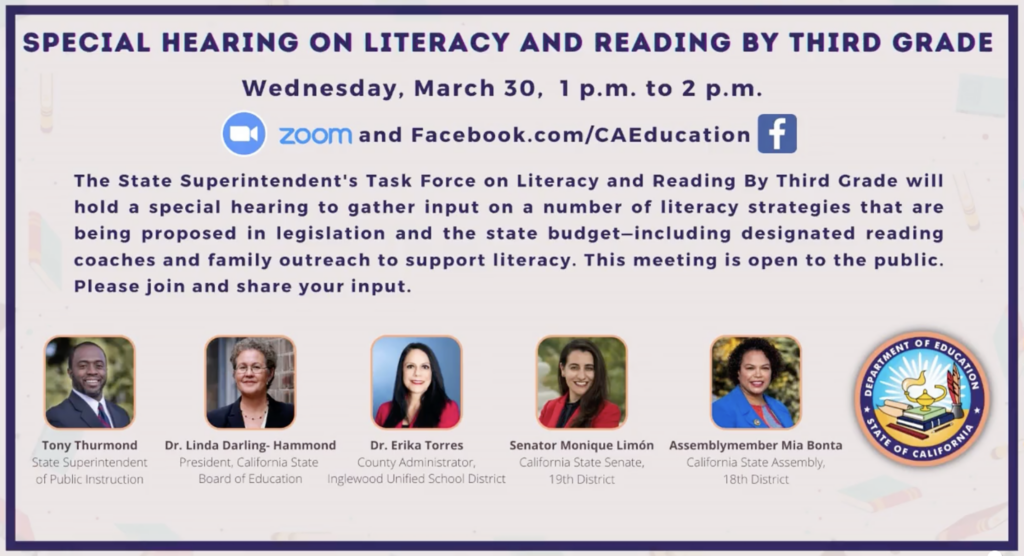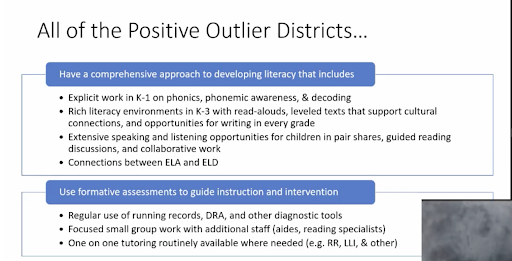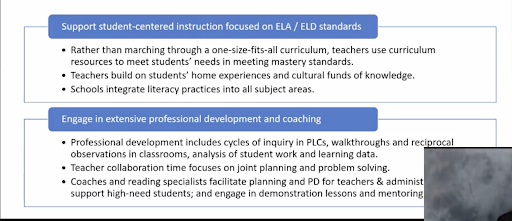Blog
California Continues to Advance Early Literacy with New Legislation and Proposed Funding
Share

April 29, 2022
Written by Exequiel “Rex” Ganding, OLC Associate Director of Community Engagement
On March 30, California Superintendent of Public Instruction, Tony Thurmond, held a “Special Hearing on Literacy by the Third Grade” to report on progress and pending legislation and budget allocation for his campaign to Ensure that Every California Student Learns to Read by the Third Grade by 2026. The Oakland Unified School District has demonstrated their own commitment to literacy by putting reading first.
Panelist Dr. Erika Torres from the Inglewood Unified School District noted that districts need support and funding at the state level to advance literacy outcomes. “School districts should not be required to allocate their own funding for these resources. This is something that should be provided to us.” We agree, this work must be supported and invested in at the state level.
The pending legislation and budget allocations will help to bolster our community’s ongoing effort to have every Oakland child learn and love to read. We have provided links to the text of relevant legislation along with status and contact information to express support for or comment on these bills. To support or comment on funding proposals, contact the Assembly Committee on Budget.
You can view the full video of the one-hour panel discussion here.
The 4 Characteristics of High Performing School Districts
Dr. Linda Darling-Hammond shared findings of a 2019 study that identified the characteristics of “Positive Outlier Districts”. Here are the four common literacy practices shared by those districts:
- Have a comprehensive approach to developing literacy
- Use formative assessments to guide instruction and intervention
- Support student-centered instruction focused on ELA/ELD standards
- Engage in extensive professional development and coaching
Locally, OUSD has identified these practices as priorities in their strategic plan and curriculum adoption processes. It is vital that the district follows through on these priorities throughout implementation. Additionally, these practices are reflective of efforts around the nation to overhaul reading instruction. These four characteristics were also used as an introduction and rationale for the pending legislation and proposed funding recommendations that would be discussed.


Investing in Literacy Specialists and Instructional Coaches
Dr. Erika Torres, County Administrator of the Inglewood Unified School District, advocated for State funding for school Literacy Specialists and Instructional Coaches to provide support, expertise, and training for teachers and literacy staff. “[Reading specialists] could provide targeted evidence and assessment-based interventions for our students. They can support teachers, grade-levels, and departments in analyzing literacy data in order to refine reading instruction and also help to facilitate individual support and small group instruction.” As for Instructional Coaches, they “could conduct demonstration lessons and assist with curriculum planning and pacing.” As reported by the Edsource, Governor Gavin Newsom’s 2022-23 budget proposal (see page 14 for new literacy initiative) in January includes over $500 million over the next 5 years for high-needs schools to train and hire literacy coaches and specialists.
Promoting Family and Parent Engagement
Dr. Torrres went on to discuss funding the development of a “parent literacy center” at every district school to provide families with resources to foster literacy development at home. AB 2645 (currently in the Assembly Committee on Appropriations), authored by assembly member Mia Bonta, includes approximately $37M from the general fund to “the California Family Literacy Innovation Project to support community literacy by establishing partnership between educational agencies and community organizations.” New First 5 CEO, Jackie Wong, noted that her organization is proposing to match the $10M in state funding for fiscal year 2022-23 for early childhood literacy and book distributions. “This matched fund will be part of a partnership with the California Department of Public Health to provide multilingual books early literacy programming for families with young children in collaboration with other state programs.”
Expanding Biliteracy and Dual Language Immersion ProgramsSenator Monique Limon provided a summary of SB-952– The Dual Language Immersion Grant Program – which passed the Senate Education committee. “This is a bill to expand cultural and language learning in school grants programs to be administered by the California Department of Education.” The bill intends to provide the financial resources to meet the increasing high rate of demand for dual immersion programs in California school districts. SB-952 will now go to the Senate Appropriations Committee and you can express your support for the bill by contacting members here.



